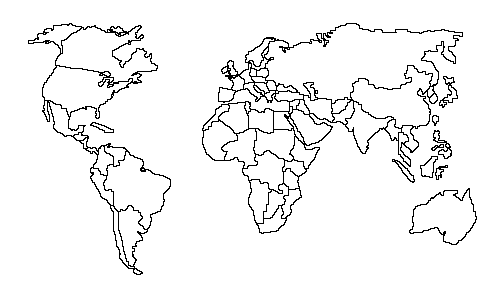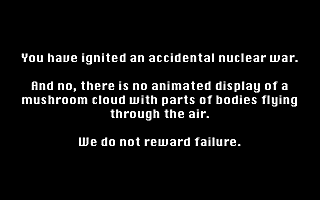
I was going to make this a minutiae item, but it got less minute. On 1995 January 25, a radar station in Murmansk detected what appeared to be a Trident missile heading into Russian airspace. It was actually a rocket carrying scientific equipment. Russian authorities had been notified of the impending launch, but none of them had passed word along to the radar technicians — or to Boris Yeltsin, who was given ten minutes to decide whether to launch a counterstrike. Yeltsin decided against it. Why would Bill Clinton have decided to nuke us? It must be a mistake. This is the kind of leeway you get when your leader isn't a saber-rattling prick. Imagine if this incident had happened in 1985 rather than 1995. Do Konstantin Chernenko's handlers give the same benefit of the doubt to the man who a few months earlier had jokingly announced that he'd just launched a first-strike against the USSR? Speaking of 1985, the map above is from a computer game that came out that year. It's called Balance of Power. In this game, you play one of the Cold War superpowers, and attempt to topple unfriendly governments and preserve friendly ones without sparking a crisis that results in a nuclear war. In a crisis, you have the option to either back down, resulting in a loss of prestige, or escalate, raising the stakes. A diplomatic crisis can escalate into a military crisis. DEFCON 1 launches the ICBMs, ending the game. But DEFCON 2 and DEFCON 3 carry the risk that the next screen you see will be this:
 I was enough of a BOP addict that I bought the companion book in which programmer Chris Crawford lays out the algorithms he used in the game. Three variables that come up in the equations are Adventurousness, the superpower's demonstrated willingness to exercise its military might around the world; Pugnacity, its proclivity to escalate crises rather than attempt to defuse them; and Nastiness, the background level of hostility that influences every geopolitical interaction. Basically, the more you act like a saber-rattling prick, the more likely it is that your opposite number will do the same — and the more likely that moments such as that ten-minute window in 1995 result in a global holocaust. This weekend I've read posts by a number of people complaining that Barack Obama won the Nobel Peace Prize when he "hasn't done anything." My response is that Bill Clinton saved the world in 1995 without "doing anything." Yeltsin had to ask himself, is the United States the sort of adventurous country that would launch a reckless war of choice? Is it the sort of pugnacious country more interested in winning showdowns than in forging agreements with the rest of the world? Is the world a nasty enough place that things might really have come to this? Clinton had convinced Yeltsin that the answer to all these questions was no. And that is why there are still lifeforms on this planet more advanced than a cockroach. My more literal-minded readers should note that I am not arguing that Obama received the Nobel Peace Prize solely for lowering the likelihood of accidental nuclear war. The rocket incident of 1995 is intended to serve as an emblematic example of how lowering those background variables contributes more to a peaceful world than does brokering a single showy treaty, much as a cure for Creuztfeldt-Jakob disease would be awesome but would contribute much less to world health than smoking bans. George W. Bush and his administration spent eight years shouting at the top of their collective lungs that they intended to launch invasions wherever they saw fit, that they'd best all comers, and that they didn't really give a shit what the rest of the world thought. Peace is not just the absence of war; it includes the absence of this sort of adventurousness, pugnacity and nastiness. So to the extent that Obama has convinced the world that he genuinely intends to bring this era of American foreign policy to a close, he has significantly contributed to world peace. Though I have heard it argued that the prize should really go not to Obama himself but to the voters who selected him over the adventurous, pugnacious, nasty John McCain. So divide $1.4 million by 70 million Obama voters, and... well, you get a whole new twist on "and that's my two cents."
Return to the Calendar page! |